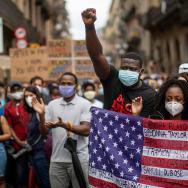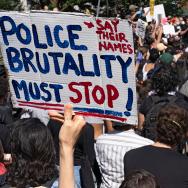Black voters and activists have played an especially decisive role in shaping America’s future in 2020, from elevating Joe Biden’s candidacy in South Carolina in February to refocusing the national conversation around systemic racism and police brutality in May and June.
While Biden and Kamala Harris have won the White House, turnout among Black voters still has the potential to shape their agenda: Control of the Senate now hinges on runoffs in Georgia, a longtime Republican stronghold that has turned into a swing state in part because of organizing by Black activists.
Biden’s victory in Georgia marks the first there for Democrats at the presidential level since 1992—but it was not a surprise to University of Chicago political scientist Michael Dawson. An expert on African American political behavior, identity and public opinion, Dawson attributes the state’s electoral shift not only to demographic changes, but to a decade of work by Black activists.
In the following Q&A, the John D. MacArthur Professor of Political Science discusses trends and takeaways from the 2020 election, the future of Black politics in the United States, and why Trumpism will persist even after Donald Trump leaves office.
In his victory speech, Biden specifically thanked Black voters for lifting his candidacy, saying that they’ve had his back and that he’ll continue to have theirs. How can he make good on that promise once he takes office?
To do so other than symbolically, Biden will need to address the economic devastation that many Black communities are experiencing. Some of the things that would really constitute a change for those communities actually aren’t race-specific; they’re universal. Medicare for All, for example, would be beneficial. So would the Green New Deal or other programs that might create new job opportunities. Making Washington, D.C., a state would also improve representation for Black Americans in Congress, but that seems unlikely, especially without control of the Senate.
Biden has been reluctant to embrace many of these more sweeping proposals outright. But one more achievable thing Biden could do with the powers of the executive branch would be to clamp down on the racist, right-wing movements that have incited violence across the country. The FBI and the Department of Homeland Security have already said that these right-wing movements are the biggest domestic threat to the security of the United States. That sort of consensus should make it possible to address the problem even within a more moderate agenda.
How do you think the Black Lives Matter movement and protests against police brutality and systemic racism might change or evolve under a Biden administration?
We have to remember that those movements were well underway before 2016. They actually originated during the Obama administration, and were focused initially on instances of police brutality in places like Chicago and Ferguson, Missouri. Police brutality will continue to be a central focus, although there’s also been increased attention given to economic issues, including universal health care. One thing that activists have established as a priority is opposing local candidates, like prosecutors whom they feel have not been aggressive enough about accountability in police departments.
Another thing that might be somewhat different than what we saw during the Obama administration is a more deliberate focus on holding the Biden administration accountable. So, when Biden says that he has the Black community’s back, he should expect to hear from various components of the Black community. That includes Black youth activists from the Movement for Black Lives, BYP100 and similar organizations.
Biden flipped Georgia, a state long held by Republicans. Were you surprised by the result there, and what role you think Black voters played?
I was not surprised by the result in Georgia. That victory was due in large part to 10 years of organizing by people like Stacey Abrams and hundreds of other Black activists—many of them Black women—who laid the infrastructure that made a win in Georgia possible.
The organizing has also combined well with other demographic and political phenomena. The first is the increasing importance of Atlanta and its suburbs and other mid-sized cities in the state’s electoral landscape, which is part of a larger urban and suburban shift toward Democrats across the United States. The second is the excesses of Trump and his administration, which accelerated those shifts and contributed to higher turnout among Black voters in Georgia.
The question is, to what degree will we see this shift play out in other states? Though it didn’t materialize this year, we may eventually see a similar shift in Texas, both because of the Latinx population and the large number of major cities. It’s harder for me to see more rural states like Mississippi and South Carolina changing in the same way, because cities there just don’t comprise a large enough percentage of the population.
Both Senate seats in Georgia are now heading to run-off elections in January. Do you think continued organizing will help Democratic candidates win those seats?
I do think there’s a chance. I’ve been telling people informally—and I don’t have the data on hand right now to make a firmer prediction—but my best guess is that it’s going to be a split, with one seat going to each party. But it’s also very plausible that either party will capture both seats.
Trump improved his margins among Latino voters and Black men in 2020 as compared to 2016. What do you make of that?
I think two or three things are relevant here. One was that Republicans did more targeted advertising toward specific groups of non-white voters. In Venezuelan and Cuban communities, they highlighted the claim that Biden’s administration would be “socialist,” which struck a chord among those groups. Trump’s appeal to Black and Latino men also came in part, I think, from his leadership style, which resonates with a brand of masculinity that is deeply embedded in American culture across racial lines.
The final thing I would point to is an article I wrote with Megan Ming Francis at the University of Washington on neoliberalism and Black politics. The Trump administration, at the urging of people like Jared Kushner, emphasized Black entrepreneurship, and a promise of economic investment that would allow entrepreneurship to flourish. That tapped into a strong conservative current in the African American community that goes back decades.
Where do you think we saw the biggest differences in policy priorities between Black voters and other groups?
The economy has generally been the top issue in Black communities in recent decades. This year, I would say COVID-19 is at least as important, but absent COVID, the economy would be the top issue again. The third issue this year has always been a significant one for Black Americans, but was especially significant in 2020: apprehension about the rise of open racism, including violent attacks against Black people and Black communities, and concern about the rhetoric of the president himself.
Are there any trends from the 2020 election that relate to your current research, or that you might want to study?
I’m currently writing about multiple crises in American politics, and the role that racial resentment has played in exacerbating those crises. I think it’s important to understand and remember that Trump received more than 70 million votes, even though he lost. As many commentators have already noted, Trumpism is going to survive Trump. A significant portion of the electorate is still attracted to his message of racial division and conflict. People see themselves as the victims of an out-of-control group of minorities and immigrants, and that’s going to be a difficult phenomenon for the Biden administration—and the American political system in general—to remedy.












 —Prof. Kunle Odunsi
—Prof. Kunle Odunsi
